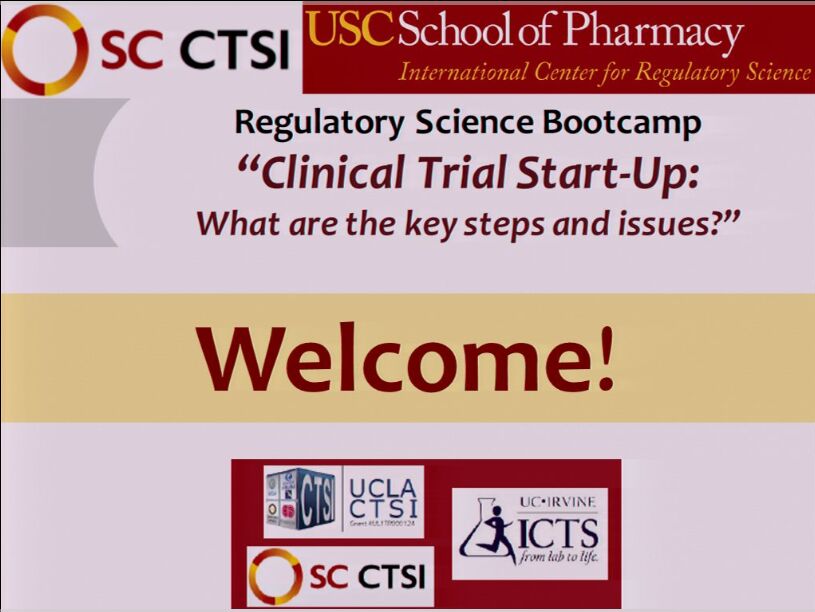- Welcome! – by Dr. E. Pacifici
- Regulatory landscape differs across the process (not regulated vs. highly regulated)
- 5 graduate streams available at USC Regulatory Science department
- Poll Time!
- How would you describe yourself? Ex. Regulatory Professional
- How long have you been in your role?
- In which of the following types of studies are you involved in?
- What do you find to be the greatest hurdle in starting a clinical trial?
- Over the last 3 years, starting a clinical trial has become easier/more difficult/unchanged
- Do you currently use social media in clinical trials?
- A referral payment for a clinical must be minimal so that it is not seen as coercive (T/F)
- An institution can include discounted serviced for clinical trail sponsors as part of the clinical trial agreement (T/F)
- The Principal Investigator and the study coordinator share the responsible for the conduct and oversight of the research including human subject protection (T/F)
- Which of the following is not required criteria for IRB approval?
- At what point should a research team consider study feasibility?
- Presentation Title: Clinical Research Support (CRS) Group: Supporting Investigator-Initiated Trials of USC
- Led by April W. Armstrong, MD MPH
- Challenges in conducting Investigator-Initiated Studies
- Clinical Research Support (CRS) at USC
- Group Services ex. Research navigation, feasibility review, recruitment
- Help from beginning to end of research project
- Starting off Right in Clinical Trial Start-Up
- A Joint Presentation by Kevin Kelly MD., PhD. And Joyce Nancarrow Tull, MSN, CCRP
- Mostly common sense---just the basics
- Key Elements of Success in Clinical Objectives of This Segment
- What are the Key Elements in Successful Study Start-Up?
- Research is a collaborative effort
- Communication
- Baseline Trial Information
- Established Metrics
- The Right, “Knowledgeable” Team
- Complete Documents
- Clear Process
- CISO Process Map
- User-Friendly Database
- Tracking and Transparency
- The Right Resources
- Positive Attitude
- Research is a collaborative effort
- Dr. Pacifici’s Conclusions/Q&A with Joyce Nancarrow Tull
- Importance of Logistics ie. Having clear-cut processes in place
- In cancer, there is pre-site visit and look at facilities, appropriate documents, and faculty for the trial site choice
- USC has an expanded feasibility check-list
- Final CIC review is when the trial is allowed to start
- Polishing Tool from USC Norris Cancer Center
- Use of Databases- interface, how it is set up, function
- Challenge: Knowing what your systems can do for you and how can you bridge the gaps
Regulatory Science Symposium: Clinical Trial Startup Session 1: Introduction/Clinical Research Support Office/Starting Off Right: Elements of Success: A Clinical Trial Site’s Perspective (2016)
In this session, we will discuss how to begin the clinical trial process feasibly and correctly and the importance of such a start, briefly focusing on the clinical trial process in the field of cancer.
Chair and Associate Professor of Regulatory and Quality Sciences Associate Director, D. K. Kim International Center for Regulatory Science
Course Syllabus/Topics
Acknowledgement
Accompanying text created by Annie Ly | Undergraduate Research Associate and Provost's First Generation Research Fellow | lyannie@usc.edu



